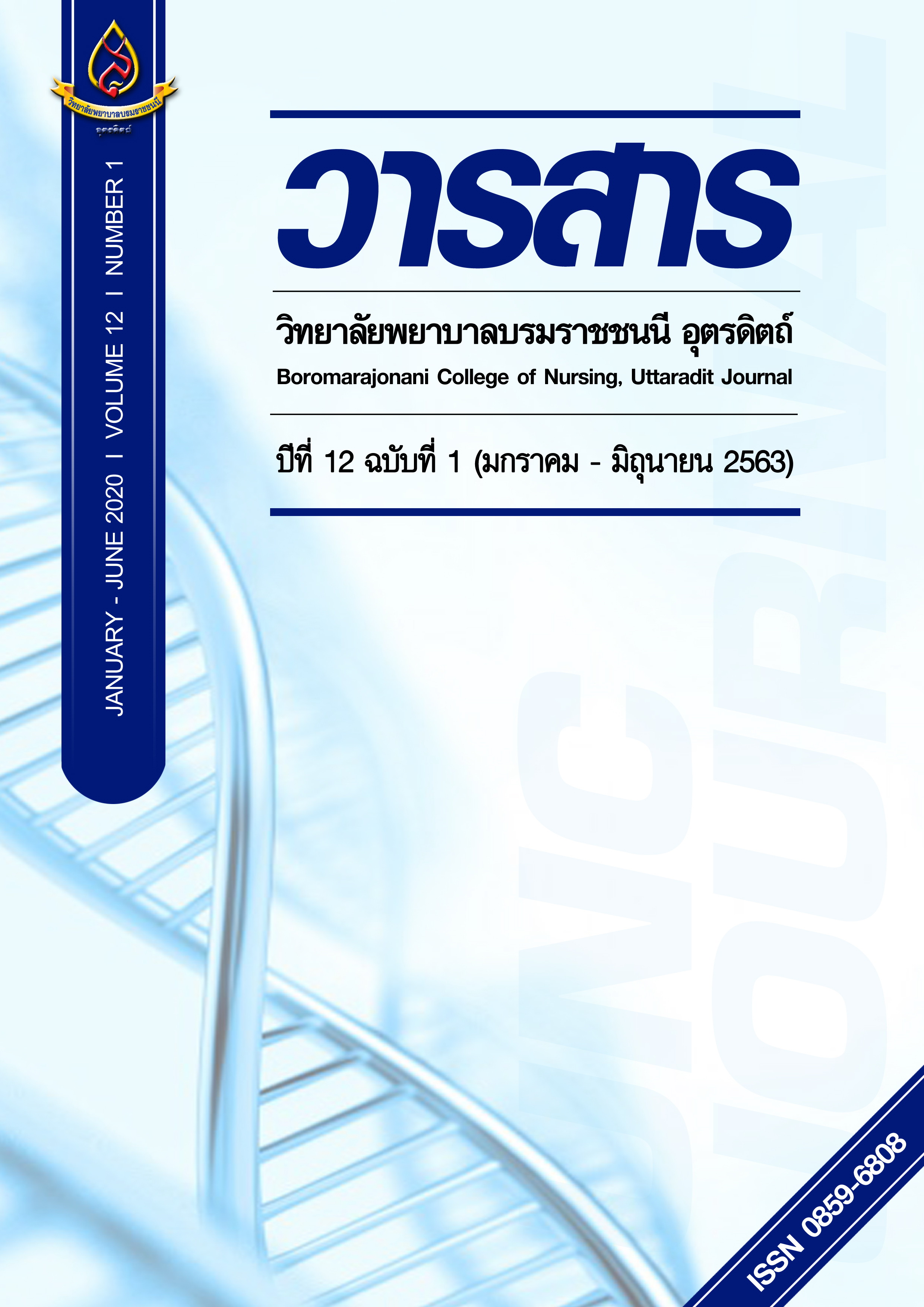ผลของรูปแบบการประเมินทักษะทางคลินิกด้วยวิธี OSCEs: ต่อผลสัมฤทธิ์ วิชาปฏิบัติการพยาบาลผู้ใหญ่และผู้สูงอายุ 2 ของนักศึกษาพยาบาล
Main Article Content
บทคัดย่อ
การวิจัยแบบทดลองขั้นต้นมีวัตถุประสงค์ เพื่อศึกษาผลสัมฤทธิ์วิชาปฏิบัติการพยาบาลผู้ใหญ่และผู้สูงอายุ 2 ที่ใช้รูปแบบการประเมินทักษะทางคลินิกด้วยการสอบ OSCE กลุ่มตัวอย่างคือ นักศึกษาพยาบาลชั้นปีที่ 3 คณะพยาบาลศาสตร์ มหาวิทยาลัยสวนดุสิต โดยการสุ่มอย่างง่าย จำนวน 87 คน เครื่องมือที่ใช้ในการวิจัย คือแบบการประเมินทักษะทางคลินิกด้วยวิธี OSCE และแบบประเมินผลสะท้อนของประสบการณ์ วิเคราะห์โดยใช้สถิติเชิงพรรณนา และการวิเคราะห์เนื้อหา
ผลการวิจัย พบว่า ผลสัมฤทธิ์วิชาการปฏิบัติการพยาบาลผู้ใหญ่ และผู้สูงอายุ 2 มีค่าคะแนนเฉลี่ยในภาพรวม เท่ากับ 77.58, SD = 5.90 ผลสะท้อนจากประสบการณ์ ของการใช้รูปแบบการประเมินทักษะทางคลินิกด้วย OSCE พบว่า มีหลักเกณฑ์การประเมินที่ชัดเจน และนักศึกษารู้สึกเครียดกับการสอบ OSCE มากที่สุด ( X = 4.34, SD = .66, .80) ความคิดเห็นที่ต้องพัฒนาตนเองมากที่สุด ด้านความรู้ เกี่ยวกับโรคและการพยาบาล ด้านเจตคติ เกี่ยวการปฏิบัติการพยาบาลด้วยความนุ่มนวล และเอื้ออาทร และด้านทักษะการปฏิบัติทางวิชาชีพ เกี่ยวกับการประเมินอาการเพื่อให้การพยาบาลผู้ป่วย ( X = 4.23, 3.98, 3.93 SD = .76, .90, .79) ตามลำดับ นักศึกษามีปัญหามากที่สุด คือ ไม่สามารถจัดลำดับความสำคัญได้ว่าจะปฏิบัติกิจกรรมพยาบาลใดก่อนหลัง และในการแก้ปัญหาดังกล่าวนี้ตนเองต้องเตรียมความรู้ก่อนสอบ จากการวิจัยแสดงให้เห็นว่า รูปแบบการประเมินทักษะรวบยอดด้วยข้อสอบ OSCE สามารถประเมินผลสัมฤทธิ์ในการปฏิบัติทักษะทางคลินิกได้ จึงมีความเหมาะสมที่จะใช้ในการประเมินทักษะการปฏิบัติพยาบาลอื่นๆ ต่อไป
Article Details
บทความหรือข้อคิดเห็นใดใดที่ปรากฏในวารสารวิจัยการพยาบาลและวิทยาศาสตร์สุขภาพ เป็นวรรณกรรมของผู้เขียน ซึ่งบรรณาธิการหรือสมาคมศิษย์เก่า ไม่จำเป็นต้องเห็นด้วย และบทความที่ได้รับการตีพิมพ์เผยแพร่ถือเป็นลิขสิทธิ์ของวารสารวิจัยการพยาบาลและวิทยาศาสตร์สุขภาพ
เอกสารอ้างอิง
Ahuja, J. (2009). OSCE: A guide for students part 1. Practice Nurse, 37(1), 37-39.
Ariya, K., Kaewurai, W. & Chaisanit, P. (2016) A development of an instructional model based-on differentiated instruction approach to enhance the ability of learning management design of 21st century for student teachers, Rajabhat University. Lampang Rajabhat University Journal. 5(2), 1-17. (in Thai)
Beckhamm, N. (2013). Objective structured clinical evaluation effectiveness in clinical evaluation for family nurse practitioner students. Clinical Simulation in nursing, 9, 453-459.
Bloom, BS., Engelheart, M.D., Furst, E.J., Hill., W. H.,& Krathwohl, D.R. (1956) Taxonomy of education objective handbook 1: the cognitive domain. New York; David McKay Co Inc.
Brighton, R., Mackay, M., Brown, A., Jans, C. & Antoniou, C. (2017). Introduction of undergraduate nursing students to an objective structured clinical examination. Journal of Nursing Education, 56(4), 231-234.
Chukumnerd, S. & Puicharoen, S. (2017). The use of objective structured clinical examination (OSCE) in nursing education. The Southern College Network Journal of Nursing and Publing Health, 4(3), 236-248. (in Thai)
Graham, R. (2010). The reliability, validity, and usefulness of the objective structured clinical examination (OSCE) in dental education. (phd thesis). School of Arts and Sciences. Columbia University.
Harden, RM. & Glesson FA., (1979). The assessment of clinical competence using an objective structured clinical examination. Medical Education Journals, 13, 41-54
JO, Kae‐Hwa & AN, Gyeong‐Ju. (2014). Qualitative content analysis experiences with objective structured clinical examination among Korean nursing students. Japan Journal of Nursing Science, 11(2), 79-86.
Kooariyakul, A. (2017). Clinical learning assessment of nursing students. Journal of Baromarajonani College of Nursing, Bangkok. 33(2), 179-187. (in Thai)
Krejcie, R.V. & Morgan, D.W. (1970). Determining sample size for research activities. Educational and Psychological Measurement, 30, 607-610
McWilliam, P. & Botwinski C. (2010). Developing a successful nursing objective structured clinical examination. Journal of Nursing Education, 49(1), 36-41.
Miller, GE. (1990). The assessment of clinical skills/ competence/ performance. Academic Medicine, 65, 63-67.
Muldoon, K., Biesty, L. & Smith, V. (2014). I found the OSCE very stressful: Student midwives' attitudes towards an objective structured clinical examination (OSCE). Nurse Education Today, 34(3), 468-473.
Musikthong, J., Puwarawuttipanit, W. & Udomphanthurak. J. (2017). Learning Experiences from Clinical Practice in Medical Units and Perceived Self-Development of Nursing Students in a Bachelor of Nursing Program. Nursing Journal of the ministry of Public Health, 27(2), 181-197. (in Thai)
O’ Corner, K.., King, R., Malone, K.M. & Guerandel, A. (2014). Clinical examiners, simulated patients, and student self-assessed empathy in medical students during a psychiatry objective structured clinical examination. Academic psychiatry. 38(4), 451-457.
Phothidara, Y. (2011). Nursing Education Management: For Student Generation Y. Journal of Nursing Science & Health, 34(2), 61-69. (in Thai)
Rentscher, D., Eaton, J., Cappiello, J., McNally, S., & McWilliam, P. (2007). Evaluation of undergraduate students using objective structured clinical evaluation. Journal of Nursing Education. 46(3), 135-139.
Rungnoei, N, & Seesawang. J. (2016). Effect of self-development supportive for the pre-practicum preparation at intensive care unit on knowledge and skills among nursing students. Journal of Phrapokklao nursing college. 27 (2), 29-38. (in Thai)
Rushforth, H. (2006). Objective structured clinical examination (OSCE): Review of literature and implications for nursing education. Nurse Education Today, 27, 481-490.
Shi, Yin & Sui (2012) A analysis of objective structured clinical examination effect to the nursing undergraduates in a college. Chinese Nursing Research. 26(1C): 271-272.
Sirisupluxana, P. (2013) Teaching Nursing Students to Develop Critical Thinking Skills. The Journal of Boromarajonani College of Nursing, Nakhonratchasima, 19(2), 5-18. (in Thai)
Soivong, P., Lasuka, D., Chaiard, J., Khampolsiri, T., Phothikun, R. & Kiatwattanacharoen, S. (2014).Development and Feasibility of the OSCE-Based Medical Nursing Comprehensive Practice Achievement Test for Senior Nursing Students. Thai Journal of Nursing Council 29 (.4), 79-91. (in Thai)
Sola-Pola, M. & Pulpón-Segura, Anna M. (2014). Assessment of an evaluative tool for nursing college students: the tests for Objective Structured Clinical Examination (OSCE). BMC Health Services Research, 14(Suppl2), 96
Sriruksa, K. (2011). Evaluation of clinical skills: objective structured clinical examination (OSCE). Khon Kaen Medical Journal, 2, 4-6. (in Thai)
Terry, R., Hing, W., Orr, R. & Milne, N, (2017). Do coursework summative assessments predict clinical performance? A systematic review. BMC Medical Education. DOI 10.1186/s12909-017-0878-3
Weiner DK, Morone NE, Spallek H, Karp JF, Schneider M, Washburn C, Dziabiak MP, Hennon JG, & Elnicki, DM. (2014). E-learning module on chronic low back pain in older adults:evidence of effect on medical student objective structured clinical examination performance. Journal of the American Geriatrics Society, (6), 1161-1167.


